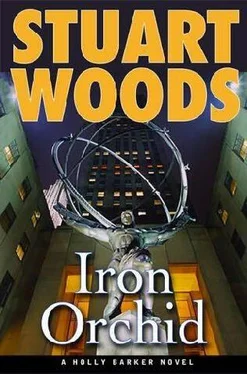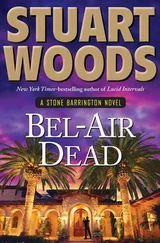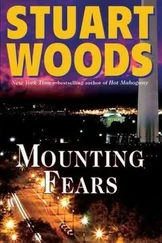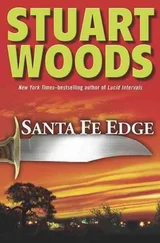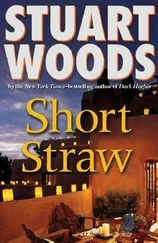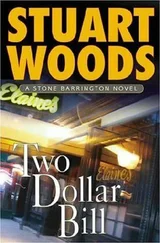“Oh, Ham, stop it. You’d be perfectly welcome.”
“I know we would, but we’d prefer a hotel.”
“Give me a little time to get my feet on the ground, then come visit.”
“Okay. How’s the work going?”
“It’s good but frustrating. We’ve got a tough assignment, and it isn’t going as well as I’d like.”
“Well, if you’re willing to say that, things must be going pretty badly.”
“Now you’re getting the picture.”
“Tell me about the apartment.”
“I’ll wait and let you see it. Your daughter has come up in the world.”
“I’ve been tempted to open that envelope you gave me.”
“Don’t you dare, unless you hear I’m dead.” The envelope contained a copy of her will and the second credit card that would give Ham access to the Cayman bank account, plus a letter explaining everything.
“Okay, it’s in my safe until the day. But you better not die before me; I’ll kick your ass.”
“I know that. Listen, I’ve got to run; I’ve got a ton of work about to fall on me. I’ll call you next week. Love to Ginny.”
“Bye-bye.” Ham hung up.
“Come on, Daisy,” Holly said. “Let’s go shopping.”
TEDDY FAY WAS WALKING to his workshop when he saw Holly Barker and her dog on the other side of the street. He watched her out of the corner of his eye without turning his head; it still made him nervous to see her around. She must live nearby, he figured.
Once locked into his workshop, he fired up his computer and used the disks Irene Foster had given him to log into the CIA mainframe. He spent two hours constructing a file for a fictitious officer, Charles Lockwood, supplying Lockwood with a biography, an educational background, a service record, a financial history and the proper security clearances. To entertain himself, he had Lockwood reporting directly to Hugh English, the deputy director for operations. Now he could safely log into the mainframe at any time.
When he was finished, he went into the personnel records and pulled up Holly Barker’s file. He read through it carefully, then read the Agency’s investigation report on her background and the record of her training at the Farm. She sounded like a good one, he thought. He read the account of the incident with Whitey Thompson, which the director of training himself had apparently witnessed, and was much amused by it. He had outfitted Whitey, once, for a mission in East Germany, and from what he had heard later, the man had turned out to be a disaster in the field, blowing the whole operation and almost getting two of his colleagues killed. After that, he had been banished to the Farm, where the Agency had figured he couldn’t get into too much trouble teaching trainees to kill people.
HOLLY WENT TO A HARDWARE STORE called Gracious Home, which also had a furnishings shop, across the street. Lance had given her the name of the place, and it turned out to be a gold mine for what she needed for her apartment. She shopped for an hour, then filled out a charge account application, giving Morgan amp; Bailey as her employer. The front operation was turning out to be a very convenient thing to have as support. She felt almost like a real New Yorker, now, with an apartment and a conventional job and the business cards Lance had given her. She asked the store to deliver her purchases to her apartment building, then she walked the few blocks to Central Park and made her way downtown, sometimes jogging alongside Daisy to give her some exercise. She enjoyed herself. Tomorrow she would be back at work, looking for Teddy Fay.
TEDDY SPENT THE AFTERNOON going through the operations directorate’s files on terrorist suspects attached to foreign embassies and with diplomatic immunity. He’d let the Agency take care of the clandestine individuals and groups who had no immunity. He’d deal with the ones the Agency and the FBI couldn’t touch, because of their diplomatic status.
There were a surprisingly large number of them. He selected three and began downloading their dossiers from the CIA mainframe.
HOLLY ARRIVED BACK at her apartment, where her purchases from Gracious Home were waiting for her. She put everything away, then ran a hot bath and slipped into the big, old-fashioned tub, while Daisy curled up on the mat next to her.
There was something still missing in her life; she had been able to put it out of her mind while she was in training and after her arrival in New York, but now it was creeping back into her brain, and into other places, as well.
She needed a man.
HOLLY SAT IN THE LITTLE THEATER on the eleventh floor of her headquarters, which the agents had begun calling the Barn. Kerry Smith, her FBI co-boss, was at the lectern; the screen behind held a sketch that Holly had worked on with an Agency artist.
“This is a drawing of the man Holly Barker sat with at the Metropolitan Opera,” Kerry was saying, “minus the hat, the glasses, the nose and the bad toupee. This is the man we now know to be Teddy Fay.”
It looked sort of like him, Holly thought, but he was so ordinary that he could qualify as the wallflower at any dance.
“As you can see, there is nothing whatever distinctive about him,” Kerry was saying, confirming her judgment. “A description of him would probably match that of a hundred thousand other men in this city.”
“He looks sort of like Larry David,” somebody said.
“Who?” Kerry asked.
“The guy who’s on ‘Curb Your Enthusiasm,” on HBO.“
“I’ve never seen it.”
“He does look a little like Larry David,” somebody else agreed. “But less distinctive.”
“Swell,” Kerry said. “We also know that Fay likes the opera and that he has hairy forearms.”
“How do we know he has hairy forearms?” somebody asked.
“We had a frame of him from a security video at a church in Atlanta a few months ago, when he was trying to kill a TV preacher,” Kerry said. “He was disguised beyond all recognition, but he was wearing a short-sleeved shirt, and he had hairy forearms-gray hair.”
“Do we have fingerprints?” somebody asked.
“No, and we don’t have photographs, either,” Kerry said. “Fay went to great lengths to obliterate photographs of himself from the record of his life, such as it is. And when we got into his house in Virginia, every surface in it had been wiped down with Windex, so we don’t have any prints. None in his Maine house, either.”
“What Kerry is saying,” Lance interjected, “is that everything we know about Teddy Fay adds up to just about zero, and that is remarkable. The man worked for the federal government, for the Agency, no less, for forty years, and when he retired, he vanished like a wisp of smoke. He’s faked his death twice: once after his retirement, when he managed to insert a death certificate into his home county records, and once when he jumped out of that Cessna on the Maine coast. We could legitimately consider him dead, except that he keeps killing people.”
There was an uncomfortable stir in the room.
“We need ideas,” Kerry said, “and I don’t care how crazy they are; Lance and I will listen to any suggestion.”
Holly raised her hand. “Why don’t we pretend to be him?” she asked.
“How would that help?” Kerry asked.
“Well, could we say, after the fact, anyway, that the victims he chose were predictable?”
“I suppose so,” Kerry said. “After the fact.”
“So why don’t we make up a victim list, using Teddy’s criteria? Maybe we could get to one of them first, or at least, at the same time Teddy does.”
“That is a very good suggestion,” Kerry said. “How would you go about it, Holly?”
“Teddy is an Agency man; how would the Agency go about making a list of potential threats in New York City?”
Читать дальше
